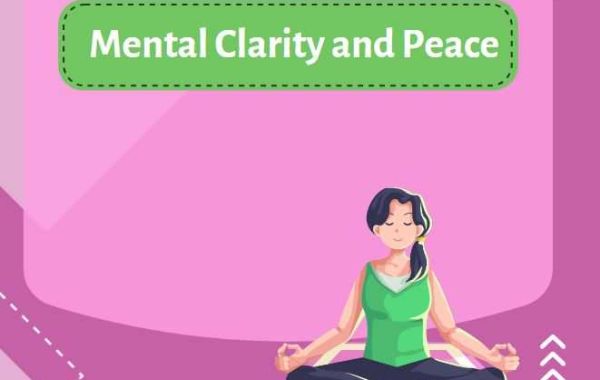We all face moments when life feels chaotic, and our minds get overwhelmed with thoughts and worries. Achieving mental clarity and inner peace is something I’ve worked towards, and while it takes time and patience, it's definitely possible.
Through personal experience and learning, I’ve found some useful strategies that can help you clear your mind and create a space of calm inside yourself.
Understanding Mental Clarity and Inner Peace
Before we explore techniques for achieving these states, it’s important to first understand what they mean.
Mental clarity is when your mind is clear, and you can focus on what really matters. It means being able to think straight, make decisions without confusion, and not feel overwhelmed by a clutter of thoughts. Mental clarity helps you handle problems better because you can approach them with a calm, organized mind.
Inner peace is a deeper sense of calmness and balance. It’s the feeling of contentment and serenity that comes from within, even if the outside world is full of challenges. When you have inner peace, you don’t get easily shaken by stress or difficulties. It’s a state where your mind and heart feel light and unburdened.
Both mental clarity and inner peace work together. When your mind is clear, it’s easier to feel peaceful, and when you’re peaceful, your mind doesn’t get clouded by stress.
Why We Lose Mental Clarity and Inner Peace
We all want to feel calm and clear-headed, but life can sometimes make that hard. Understanding why we lose our mental clarity and peace is important because once we recognize the causes, we can work to fix them.
Here are a few reasons I’ve noticed why we lose our clarity and peace:
Too Much Stress
Whether it’s from school, work, family, or other responsibilities, stress can build up in our minds. When we have too many things on our plate, it can feel like our thoughts are racing, and we don’t know where to start. This creates mental fog and makes it hard to focus.
Constant Distractions
We live in a world full of distractions—phones buzzing with notifications, social media, video games, and endless information from the internet. When I’m constantly switching from one thing to another, it’s hard to concentrate on what’s important. This scattering of attention makes my mind feel cluttered and unfocused.
Negative Thoughts
Sometimes, our own thoughts can be the biggest obstacle to peace. Worrying about the future, overthinking past mistakes, or feeling insecure about ourselves can all lead to mental confusion and anxiety. These thoughts drain our mental energy and make it difficult to feel calm or clear-headed.
Lack of Sleep or Physical Care
Not taking care of our bodies can also affect our minds. I’ve noticed that when I don’t get enough sleep, eat poorly, or skip exercise, my mind feels foggy and less sharp. Physical health and mental clarity are closely connected.
Steps to Achieve Mental Clarity
Achieving mental clarity requires taking some practical steps to clear out the clutter in your mind. Here are some ways that have worked for me:
Practice Deep Breathing
One of the easiest ways to clear my mind when I’m feeling stressed is to practice deep breathing. It’s a simple technique, but it has a powerful effect on my mental state. When I breathe in slowly through my nose, hold for a few seconds, and then breathe out through my mouth, it instantly calms my nervous system. Deep breathing helps slow down my thoughts and brings me back to the present moment.
Organize My Tasks
One major reason I lose focus is when I have too many things to do and don’t know where to start. I’ve found that writing down everything I need to do in a list or using a planner helps me organize my thoughts. Once I have my tasks written out, I can focus on one thing at a time, rather than feeling overwhelmed by everything at once.
Declutter My Physical Space
A cluttered space often leads to a cluttered mind. When my room or workspace is messy, I find it harder to concentrate. Taking a few minutes to tidy up and organize my surroundings helps me feel more focused and clear-headed. A clean, organized environment reflects a calm, organized mind.
Limit Multitasking
I’ve realized that trying to do too many things at once actually reduces my mental clarity. Whether it’s juggling homework while checking my phone or doing chores while watching TV, multitasking splits my attention and makes me feel more scattered. Focusing on one task at a time helps me do things more effectively and with a clearer mind.
Practice Journaling
When I’m overwhelmed by thoughts, writing them down helps me make sense of them. Journaling is a great way to get all my worries, plans, and random thoughts out of my head and onto paper. It allows me to see my thoughts more clearly, and often, it helps me find solutions to problems I didn’t even realize were bothering me.
Steps to Achieve Inner Peace
Inner peace is more than just quieting your mind—it’s about finding a deep sense of calm within yourself, no matter what’s happening around you. Here’s how I’ve worked on cultivating inner peace:
Practice Mindfulness
Mindfulness is a way of living in the present moment without getting lost in thoughts of the past or future. It’s something I practice daily by paying attention to what’s happening right now. For example, if I’m walking outside, I focus on the feel of the breeze, the sound of birds, or the way my feet touch the ground. This helps me stay present and reduces anxiety because I’m not constantly worrying about what’s next.
Accept What I Can’t Control
There are many things in life that I can’t control, and I’ve learned that trying to change them only causes more stress. Instead of worrying about things I can’t change—like what others think of me or events outside my control—I focus on what I can do. Accepting this helps me feel more at peace because I’m not wasting energy on things I have no power over.
Surround Myself with Positivity
The people I surround myself with have a big impact on my inner peace. I try to spend time with friends and family who are supportive, understanding, and positive. Negative relationships or toxic environments can disturb my peace, so I’m careful to create spaces in my life where I feel safe and valued.
Practice Gratitude Daily
I’ve learned that focusing on what’s going well in my life helps me feel more peaceful. Each day, I take a moment to think about what I’m grateful for. Whether it’s something big like having a loving family or something small like a delicious meal, gratitude helps shift my focus away from what’s stressing me out and towards the positive aspects of life.
Building Healthy Habits for a Clear Mind and Calm Spirit
Creating lasting mental clarity and inner peace is about forming habits that support these states. It’s not just about quick fixes but about making small, regular changes in how I live.
Create a Daily Routine
Having a consistent routine gives me a sense of stability and helps reduce stress. I try to wake up and go to bed at the same time each day, plan my meals, and make time for both work and relaxation. This structure helps me avoid feeling scattered or overwhelmed by unpredictability.
Limit Screen Time
I’ve found that spending too much time on my phone or computer can cloud my mind. Whether it’s scrolling through social media or watching hours of videos, too much screen time overstimulates my brain. By setting limits, especially before bedtime, I give my mind a chance to rest and recharge.
5.3 Exercise and Stay Active
Exercise is one of the best ways to clear the mind and maintain inner peace. Physical activity helps me release built-up tension and stress, making me feel more relaxed. Whether it’s a quick walk, a bike ride, or playing a sport, staying active improves both my mental and emotional well-being.
5.4 Prioritize Sleep
Without enough sleep, everything becomes harder—concentration fades, emotions become harder to manage, and stress levels rise. I make sure to get at least 7-9 hours of sleep each night, as this helps me wake up feeling clear-headed and calm, ready to face the day.
Being Patient and Kind with Myself
One of the most important lessons I’ve learned is to be kind to myself. It’s easy to be hard on myself when things don’t go as planned or when I’m feeling anxious, but self-kindness is key to maintaining inner peace. I remind myself that it’s okay to have off days or to feel stressed sometimes. Instead of pushing myself too hard, I focus on small improvements and celebrate the progress I’ve made.
Finding mental clarity and inner peace is a journey that requires patience, practice, and self-awareness. It’s not about being perfect but about making small, mindful changes that lead to a clearer mind and a more peaceful heart. By practicing deep breathing, mindfulness, gratitude, and healthy habits, we can create a life filled with clarity, calm, and balance. It’s all about taking one step at a time and being kind to ourselves along the way.








